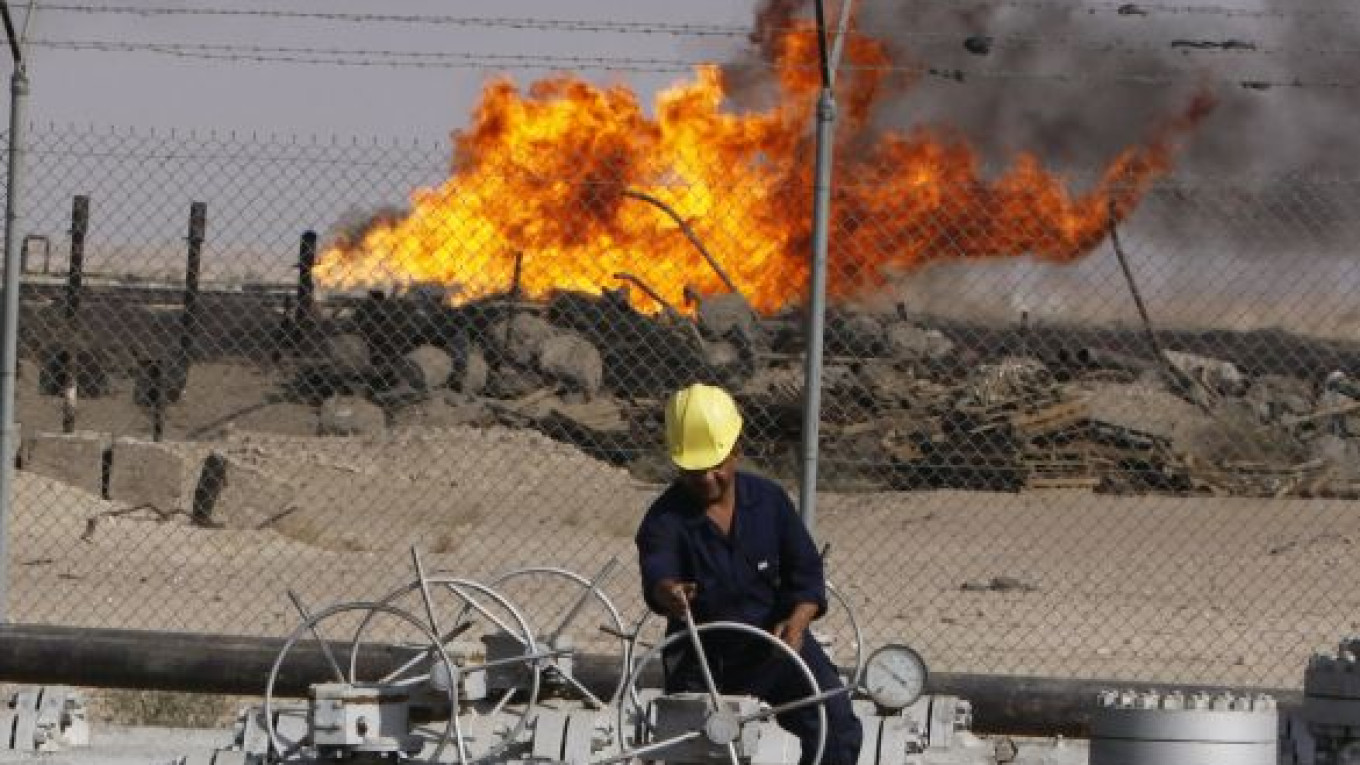A consortium led by Gazprom Neft will invest $2 billion in developing the Iraqi oil field that it won at a weekend auction and expects to pump the first crude from Badrah within three years.
Gazprom Neft plans to book some of the reserves at Badrah and to reach full production of 170,000 barrels per day within six to seven years of signing the contract, a company executive said.
“Two levels of output are defined for this field. We expect to reach initial commercial production of 15,000 barrels per day in three years,” Boris Zilbermints, Gazprom Neft’s deputy chief executive for exploration and production, said in an interview.
“We should reach the level of 170,000 barrels per day within six to seven years of signing the contract,” he said. An Iraqi Oil Ministry official said Wednesday that he expected Gazprom Neft to sign the initial deal on Dec. 24.
Iraq has deals on the table to raise oil capacity to 12 million barrels per day from 2.5 million bpd on Wednesday, a level that would eclipse second-ranked Russia and leave the country behind only Saudi Arabia.
Gazprom Neft and partners — South Korean state-run firm KOGAS, Malaysia’s Petronas and Turkish state-owned petroleum company TPAO — agreed to a remuneration fee of $5.50 per barrel in winning the rights to Badrah at a weekend auction.
Gazprom Neft, Russia’s fifth-largest oil producer, estimates the Badrah field’s reserves at 2 billion barrels. This could increase with further exploration, Zilbermints said.
He said Gazprom Neft could book some of the reserves in the field: “We will probably be able to reflect output and reserves in our financials, with a provision to show the origin of the output and reserves.”
Zilbermints said Gazprom Neft could receive either money or crude oil in return for its investment. Oil would be transported from the Gulf to the most profitable market at the time.
“We don’t plan to supply the oil to our own refineries,” he said.
U.S. oil majors were largely absent from the second round of Iraqi oil auctions, despite claims by critics that the 2003 U.S.-led invasion of the country was driven by oil.
Zilbermints said he was surprised.
“We also thought some preferences were in store for the U.S. firms, but we saw that the tender had no intention of doing this. It was an open tender in front of the television cameras.”
Continued unrest in Iraq, where a series of car bombs killed 112 people in the run-up to the oil field auctions, was an issue of some concern to the company, Zilbermints said.
“It’s scary, and in a big way. Our specialists will be working there. Security is one of the main issues in these projects. We plan to work there with maximum security for our employees,” he said.
Additional oil from Iraq’s supergiant fields, should all the contracts be fulfilled, could result in downward pressure on prices and lead companies to abandon more complex exploration projects elsewhere, Zilbermints said.
“Does the world need all this additional oil over the course of the next seven years? I think the answer will be negative.”
“Extracting oil sands is not profitable at an oil price of below $70 to $80 a barrel. These projects will probably be put off, as was the case last year when prices fell below $40.”
Zilbermints said Gazprom Neft also planned in 2010 to sign a service contract in neighboring Iran, possibly in the first six months of the year.
The Russian company last month signed a memorandum of understanding with the National Iranian Oil to study the development of two oil fields in Iran: Azar and Shangule.
Referring to the planned contract, Zilbermints said: “I think the conditions will be no worse than those under which we will work in Iraq.”
A Message from The Moscow Times:
Dear readers,
We are facing unprecedented challenges. Russia's Prosecutor General's Office has designated The Moscow Times as an "undesirable" organization, criminalizing our work and putting our staff at risk of prosecution. This follows our earlier unjust labeling as a "foreign agent."
These actions are direct attempts to silence independent journalism in Russia. The authorities claim our work "discredits the decisions of the Russian leadership." We see things differently: we strive to provide accurate, unbiased reporting on Russia.
We, the journalists of The Moscow Times, refuse to be silenced. But to continue our work, we need your help.
Your support, no matter how small, makes a world of difference. If you can, please support us monthly starting from just $2. It's quick to set up, and every contribution makes a significant impact.
By supporting The Moscow Times, you're defending open, independent journalism in the face of repression. Thank you for standing with us.
Remind me later.


